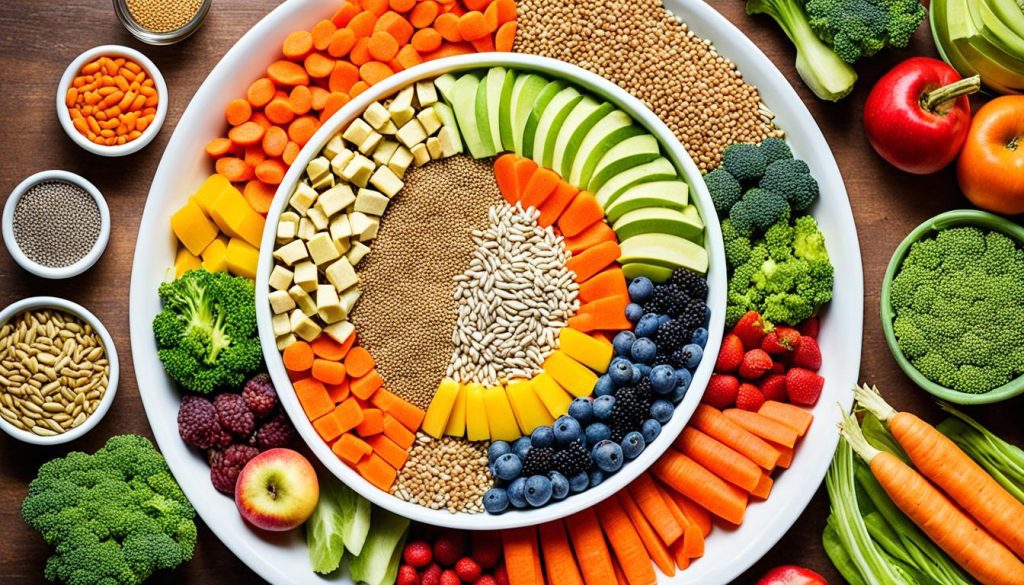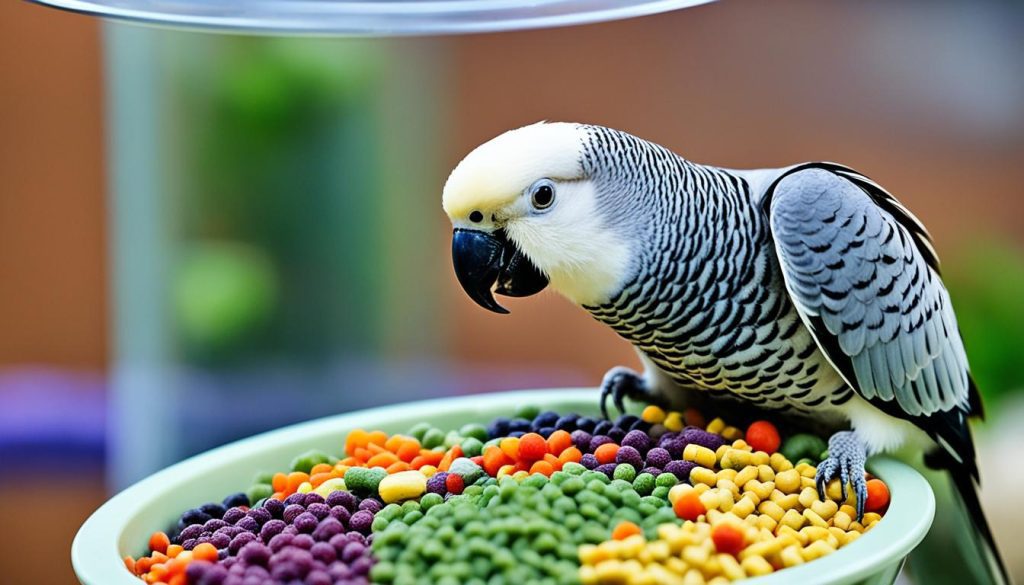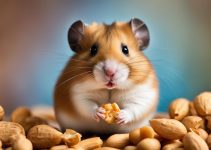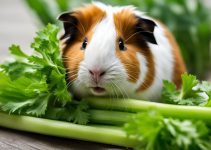Hello, bird enthusiasts! Are you curious about what to feed your beloved cockatiels to ensure they stay healthy and happy? Look no further! In this comprehensive guide, I will delve into the world of cockatiel nutrition and provide you with valuable insights on their diet.
Cockatiels, like all birds, require a well-balanced diet to thrive. Feeding them the right foods is essential for their overall health and longevity. A nutritious diet consists of a proper balance of carbohydrates, proteins, fat, vitamins, minerals, and water.
In the wild, cockatiels naturally consume a variety of seeds, fruits, berries, and vegetation. However, replicating their natural diet in captivity can be a challenge. That’s why it’s important to understand the best foods to offer and how to create a balanced diet for our feathered friends.
What Do Cockatiels Eat?
- Providing a well-balanced diet is crucial for the health and well-being of cockatiels.
- A nutritious diet includes a variety of foods such as seeds, pellets, fruits, vegetables, and water.
- Avoid relying solely on seed mixes as they may not provide all the necessary nutrients.
- Gradually transitioning cockatiels to a pelleted diet can improve their overall health.
- Offer fresh fruits and vegetables to provide essential vitamins and minerals.
Importance of Nutrition for Cockatiels
Nutrition is often neglected when it comes to pet birds, including cockatiels. As bird owners, we might assume that we are providing a proper diet to our feathered friends, but poor nutrition can have significant consequences on their overall health. Cockatiels, like any other bird, require a well-balanced diet to thrive and prevent common health problems associated with poor nutrition.
When cockatiels do not receive adequate nutrition, they become more susceptible to various health issues. Some common problems that can arise due to poor nutrition include obesity, weakened immune system, feather plucking, and digestive disorders. It is crucial to understand that cockatiels have specific dietary requirements, and fulfilling these requirements ensures their optimal physical and mental well-being.
The Link Between Cockatiel Nutrition and Health
Proper nutrition plays a vital role in supporting the overall health of cockatiels. By providing a well-balanced diet, we are enabling them to have a strong immune system, vibrant feathers, and healthy bones. Cockatiels require a rich source of carbohydrates, proteins, healthy fats, vitamins, minerals, and water to meet their nutritional needs. Lack of essential nutrients can lead to deficiencies and increase the risk of chronic health problems.
Feeding cockatiels an appropriate diet not only helps prevent health issues but also ensures longevity and a higher quality of life. As responsible bird owners, it is crucial to continually educate ourselves on cockatiel nutrition and make informed choices when it comes to their diet. By prioritizing their nutritional needs, we can provide our cockatiels with the best chance at a healthy and happy life.

What to Feed Cockatiels
Cockatiels have specific dietary needs that should be met to ensure their optimal health. While seeds are often a favorite among cockatiels, they should only make up a small portion of their overall diet. Commercial seed mixes may be high in fat and carbohydrates, and they may not provide all the necessary nutrients for your feathered friend.
Instead, a well-rounded cockatiel diet should consist of a variety of foods. Pellets are an excellent choice as they are specially formulated to provide a balanced blend of essential nutrients. These pellets can serve as the foundation of your cockatiel’s diet.
Along with pellets, fresh fruits and vegetables should also be included in their daily meals. You can offer a range of fresh produce such as leafy greens, carrots, bell peppers, and apples. Remember to wash them thoroughly and cut them into small, bite-sized pieces to ensure your cockatiel can eat them easily.
In addition to providing a varied and nutritious diet, it is vital to always have fresh, clean water available for your cockatiel. Water should be changed daily to maintain cleanliness and freshness.
By offering a combination of pellets, fresh fruits, vegetables, and clean water, you are providing your cockatiel with the necessary nutrients for a healthy and balanced diet. Consult with a veterinarian knowledgeable about bird nutrition for specific guidelines tailored to your bird’s needs. A well-fed cockatiel is a happy and healthy companion!
Converting to a Pelleted Diet
Converting a seed-eating bird, such as a cockatiel, to a pelleted diet can be challenging but immensely beneficial for their overall health. Pellets are specifically formulated to meet all the nutritional needs of birds, ensuring they receive a well-rounded and balanced diet.
To transition your cockatiel to a pelleted diet, it is recommended to gradually replace seeds with pellets and offer them as the primary food. Begin by mixing a small amount of pellets with your bird’s regular seed mix, gradually increasing the proportion of pellets over time. This gradual transition helps your cockatiel become accustomed to the new taste and texture of the pellets.
It’s important to note that the conversion process may take time and patience. Birds can be resistant to change, especially when it comes to their food. However, consistent effort, proper guidance, and monitoring can help facilitate a successful switch to a pelleted diet.
One of the key benefits of a pelleted diet for cockatiels is its nutritional completeness. Unlike seeds, which may lack certain essential nutrients, pellets are designed to provide a well-balanced combination of proteins, carbohydrates, vitamins, and minerals. This ensures that your cockatiel receives all the necessary nutrients for optimal health.
Introducing pellets into your cockatiel’s diet can also help prevent selective eating. Birds, like cockatiels, have a tendency to pick out their favorite seeds, ignoring the rest of the mix. By offering pellets as the primary food source, you encourage your cockatiel to consume a wider range of nutrients, reducing the risk of nutritional deficiencies.
Remember to consult with a veterinarian knowledgeable about bird nutrition before making any significant changes to your cockatiel’s diet. They can provide personalized guidance and ensure that the transition to a pelleted diet is appropriate for your bird’s specific needs.

Having a visually appealing and relevant image helps enhance the engagement of readers with the content. The image above showcases the process of converting a cockatiel to a pelleted diet, contributing to the overall theme of the article.
Fresh Fruits and Vegetables for Cockatiels
Fresh fruits and vegetables are an essential addition to a cockatiel’s diet as they provide vital vitamins and minerals. Including a variety of these nutritious options ensures that your feathered friend receives a well-rounded and balanced diet.
Dark, leafy greens like spinach, kale, and Swiss chard should be offered every other day, comprising approximately 20% of the cockatiel’s overall diet. These vegetables are rich in nutrients and provide important antioxidants, promoting good health and supporting their immune system.
In addition to leafy greens, other fresh vegetables such as carrots, broccoli, and bell peppers can be offered every other day as well. These crunchy and colorful vegetables provide a range of vitamins and minerals, including vitamin A, vitamin C, and beta-carotene, which are essential for maintaining healthy feathers and skin.
Fresh fruits are also a delightful and nutritious addition to your cockatiel’s diet. Berries like blueberries, strawberries, and raspberries are packed with antioxidants and can be offered every other day as a tasty treat. Other fruits like melon, papaya, or kiwi can also be included in their diet to provide variety and additional nutrients.
When offering fruits and vegetables to your cockatiel, it is crucial to wash them thoroughly and remove any seeds or pits that may be present. Always cut them into small, bite-sized pieces appropriate for the size of your bird to make it easier for them to consume. Remember that avocados should be avoided as they are potentially toxic to birds.
By incorporating fresh fruits and vegetables into your cockatiel’s daily meals, you are providing them with the essential nutrients they need to thrive. These wholesome additions not only contribute to their overall health but also contribute to their enjoyment and satisfaction with their meals.
Conclusion
Providing a balanced and nutritious diet is crucial for the health and well-being of your cockatiel. By incorporating a variety of seeds, pellets, fresh fruits, and vegetables into their daily diet, you can ensure they receive all the necessary nutrients for optimal health. Gradually transitioning them to a pelleted diet can further enhance their nutrition and provide additional benefits.
Offering a variety of fresh fruits and vegetables is also essential as they contain important vitamins and minerals that support your cockatiel’s overall well-being. Make sure to wash the produce thoroughly and cut it into small, appropriate pieces for your bird’s size. Avoid feeding them avocados, which can be toxic to birds.
If you have any concerns or questions about your cockatiel’s diet, it is always best to consult with a veterinarian who is knowledgeable about bird nutrition. They can provide expert guidance and ensure that your feathered friend is receiving the best possible diet tailored to their needs. By following these guidelines, you can help ensure a happy and healthy life for your beloved cockatiel.






